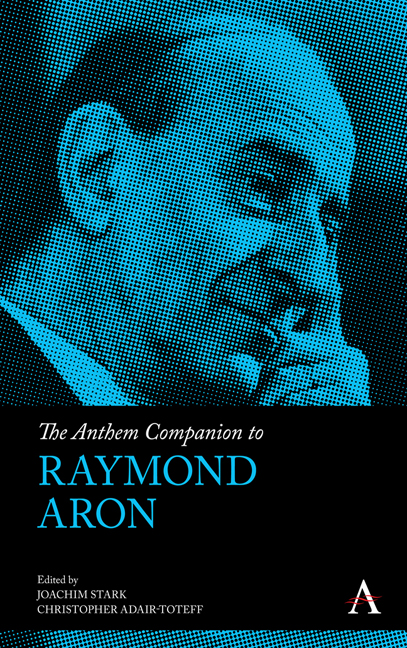Book contents
- Frontmatter
- Contents
- Acknowledgements
- Introduction: Retracing Aron’s Routes to Sociology
- Chapter One The Subject, Pluralism and Équité: Raymond Aron and Sociology
- Chapter Two Aron, Weber and Nationalism
- Chapter Three Equivocal and Inexhaustible: Aron, Marx and Marxism
- Chapter Four The Opium of the Intellectuals
- Chapter Five A New Era in the Human Adventure: Industrial Society and Economic Growth
- Chapter Six Raymond Aron: La lutte de classes
- Chapter Seven Political Philosophy Meets Political Sociology: Raymond Aron on Democracy and Totalitarianism
- Chapter Eight The Contradictions of Prometheus: Wisdom and Action after the Disillusionment of Progress
- Chapter Nine The International Problem and the Question of the Best Political Regime
- Chapter Ten War and Irrationality: Aron and Pareto
- Conclusion: Aron on Liberty
- Notes on Contributors
- Index
Chapter Ten - War and Irrationality: Aron and Pareto
Published online by Cambridge University Press: 22 February 2022
- Frontmatter
- Contents
- Acknowledgements
- Introduction: Retracing Aron’s Routes to Sociology
- Chapter One The Subject, Pluralism and Équité: Raymond Aron and Sociology
- Chapter Two Aron, Weber and Nationalism
- Chapter Three Equivocal and Inexhaustible: Aron, Marx and Marxism
- Chapter Four The Opium of the Intellectuals
- Chapter Five A New Era in the Human Adventure: Industrial Society and Economic Growth
- Chapter Six Raymond Aron: La lutte de classes
- Chapter Seven Political Philosophy Meets Political Sociology: Raymond Aron on Democracy and Totalitarianism
- Chapter Eight The Contradictions of Prometheus: Wisdom and Action after the Disillusionment of Progress
- Chapter Nine The International Problem and the Question of the Best Political Regime
- Chapter Ten War and Irrationality: Aron and Pareto
- Conclusion: Aron on Liberty
- Notes on Contributors
- Index
Summary
Great Yet Forgotten?
Though no longer included in an ever-shorter list of canonical thinkers whom apprentice social theorists must be persuaded to read, Raymond Aron has not slipped entirely from view, as have other superior societal analysts, such as Franklin Giddings, Harold Lasswell, Robert MacIver, Gaetano Mosca, Max Scheler, Alfred Schutz, Albion Small, Pitirim Sorokin, Herbert Spencer, W. I. Thomas or Florian Znaniecki—each of whom, like Aron, applauded in his time as a theorist of enduring importance. In fact, Aron's expositors, though less numerous now than during the 1960s and 1970s, continue to keep his flame lit, pursuing his far-flung scholarly and political interests along lines that he would have found faithful to his “domain assumptions” (Gouldner 1970, 31). In addition to a clutch of anglophone monographs and collections (Adair-Toteff 2019; Anderson 1997; Colen and Dutartre-Michaut 2015; Davis 2009; Frost and Mahoney 2011; Mahoney 1991; Schmitt 2018; Stewart 2019), several dozen articles are also regularly brought to the attention of interested readers that take on this or that Aronian topic with skill and the requisite depth (e.g., Baehr 2013; Campbell 1989; Davis 2008; Frost 1996, 1997; Haine 2019; Hall 2011; Hoffmann 1985; Horowitz 2006; Kerkvliet 1968; McConnell 1984; Richter 1984; Scott 2011; Shils 1985; Strong 1972; Yalem 1971).
A subgenre has for some time been probing an obvious question: “If Aron was truly as brilliant and creative as his admirers claim, why has his name and his 40 books been eased out of scholarly or journalistic discourse these 37 years after his death?” A question easier posed than answered, for he does have his champions. That singular arbiter of scholarly reputation, Edward Shils, begins his unique memorial to Aron without inhibition:
Raymond Aron had many great virtues as an intellectual and citizen. Among these numerous virtues were a penetrating, pervasive intelligence operating over a very wide range, an exceptional speed in focusing his mind on fundamentals in the midst of a chaos of particular facts, an immense stock of knowledge in philosophy, history, economics, sociology, and politics, a vast capacity for unceasing and strenuous work, a quiet and tenacious courage, and sobriety and lucidity of outlook and style. (Shils 1985, 161)
- Type
- Chapter
- Information
- The Anthem Companion to Raymond Aron , pp. 169 - 188Publisher: Anthem PressPrint publication year: 2021



